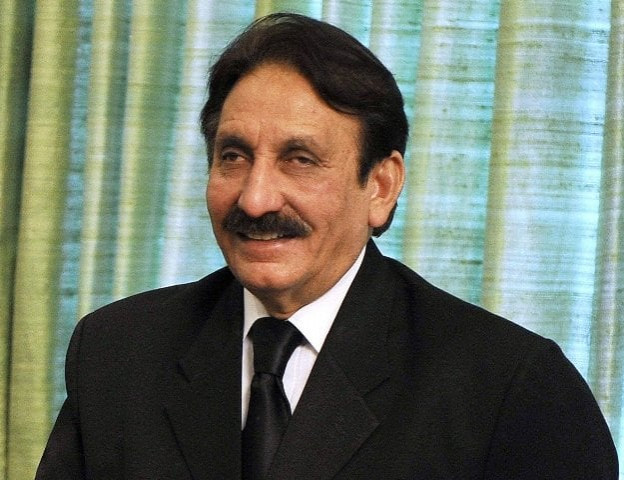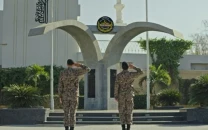Holding CJP hostage: Police officer seeks contempt case against ex-army officers
Former CJP held hostage at Army House in 2007

Hashmi's counsel stated that his client was presently unavailable and on March 13, 2009 Javed Iqbal had taken oath as the top judge and Chaudhry had vacated the post. PHOTO:FILE
The five-judge larger bench of the apex court, headed by Justice Asif Saeed Khosa, was hearing appeals filed by seven former members of the Islamabad capital administration and police personnel.
All of them have been convicted for roughing up former chief justice Iftikhar Muhammad Chaudhry.
Harsher sentences: SC to re-interpret contempt law
Ibrahim Satti, the counsel for ASP Jameel Hashmi, wondered why the apex court did not initiate contempt proceedings against top army officers, who held the former chief justice hostage for several hours on March 9, 2007.
He also pointed out that although Justice Javed Iqbal had taken action against the alleged manhandling of the former CJP, he did not issue contempt notice to these military officers.
Satti also read out the former CJP’s affidavit, in which he narrated events of March 9, 2007 at the President’s camp office in Rawalpindi.
According to the affidavit that top intelligence officials had constantly pressured him to resign, and after keeping him confined for more than five hours, he was allowed to leave in his car, which was stripped of the flag. “I was informed that I was restrained from acting as the chief justice.”
According to the affidavit, former ruler Pervez Musharraf, then PM Shaukat Aziz, Directors-General of Military Intelligence (MI), Inter-Services Intelligence (ISI), Intelligence Bureau (IB), the Chief of Staff, and another official were all in the same room.
All of these officials (except the IB chief and the chief of staff) were in uniform.
Harsher sentences: SC to re-interpret contempt law
Satti argued that his client was not in attendance at the time. He also contended that the former CJP had been deposed and Justice Javed Iqbal had been sworn in as the acting CJP.
When the bench referred to the SC ruling of July 20, 2007, according to which no judge could be deposed during the proceedings of misconduct against him before the Supreme Judicial Council, Satti replied that if Justice Iftikhar was the CJP, why was he held hostage by military officers.
He maintained that contempt proceedings should also be initiated against military officers.
However, Justice Gulzar Ahmad observed that the bench was not hearing this matter and the apex court would take action if and when the issue was adjudicated.
Earlier, Justice Asif Saeed Khosa observed that it was common knowledge that the former CJP had been manhandled while he was on his way to appear before the Supreme Judicial Council on March 13.
He said that dignity of an individual, who held one of the highest positions in the country, had been violated in the presence of these police officials.
The judge wondered if a de facto CJP could be dragged on a road in any situation.
Justice Khosa also asked him why these police officials had not resigned after they failed to protect the dignity of that same individual.
According to him, they had just submitted their regrets to avoid the contempt proceedings and disciplinary action against them.
Satti then stated that manhandling of deposed judge did not come under the purview of the contempt law. This offence, he said, could have dealt with under the PPC.
The counsel contended that it was yet to be decided if the Contempt of Court Ordinance, 2003, or Contempt of Court Act of 1976 was applicable in the country, adding that contempt of court differed from contempt of judge.
However, Justice Gulzar told him that the court could punish any individual under Article 204 of the Constitution.
The bench also told him that his client has already tendered an unconditional apology.
“Once you plead guilty, you cannot challenge the conviction … You can only move for reducing the sentence.”
The court also told the police officers that they should have been aware of the consequences before contesting the case.
The case was later adjourned till Tuesday (today).
Meanwhile, another three-judge bench, headed by Justice Gulzar, adjourned contempt case against PML-N leader Tallal Chaudhry till Monday next week because his counsel, Kamran Murtaza, was in Quetta and was unable not appear before the bench.



















COMMENTS
Comments are moderated and generally will be posted if they are on-topic and not abusive.
For more information, please see our Comments FAQ